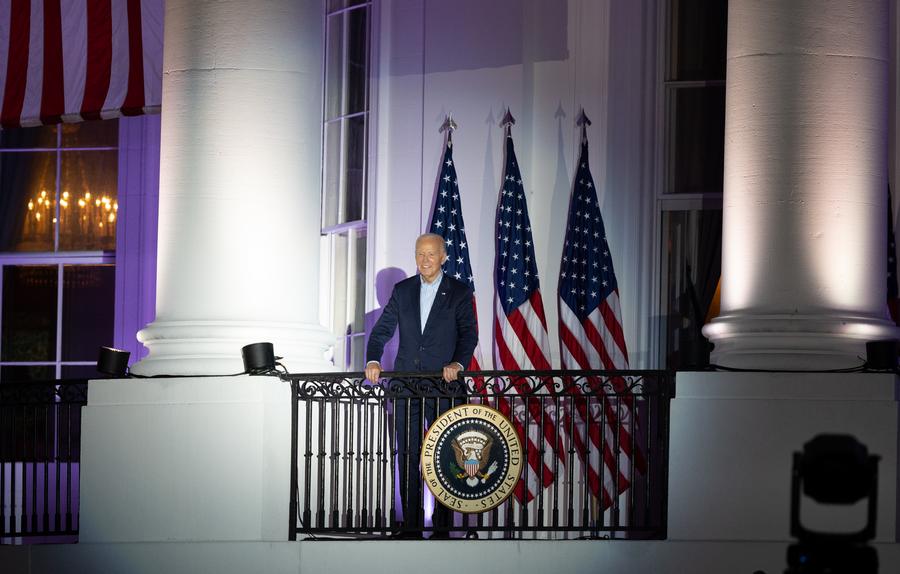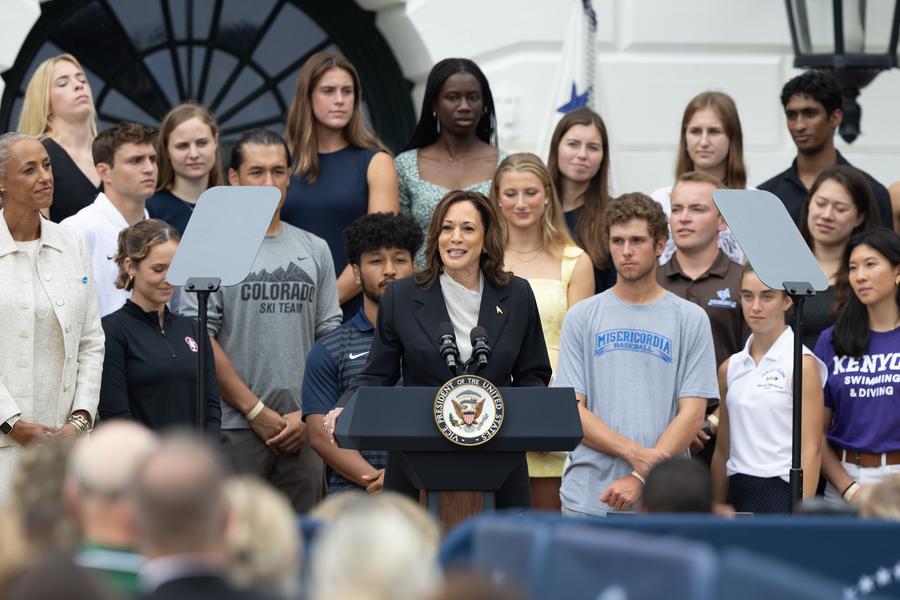Behind Biden's bowing out: party pressure, unhappy donors, and slipping swing states
BEIJING, July 23 (Xinhua) -- In a sudden turn of events, U.S. President Joe Biden announced on Sunday that he was withdrawing from the presidential race. This decision marked the end of Biden's 24-day insistence on running after a disappointing debate performance against Republican candidate Donald Trump, which led to intensified inner-party concerns about his viability as a candidate.
Despite vowing on social media the night before that "I will win it," Biden's abrupt exit underscores the significant pressure he was facing from party leaders and major donors who doubted his chances of securing victory against Trump.
GROWING CALLS FOR WITHDRAWAL
In a short letter to the nation on Sunday, Biden acknowledged that he had expected to be the nominee but changed his mind.
"While it has been my intention to seek reelection, I believe it is in the best interest of my party and the country for me to stand down and to focus solely on fulfilling my duties as President for the remainder of my term," he said.
Before his bowing-out, Biden had repeatedly reaffirmed his commitment to continuing his campaign. However, over 40 prominent Democrats publicly called on Biden to step aside following his lackluster debate performance against Trump on June 27, according to a rolling list from The New York Times.
Citing sources familiar with the matter, U.S. media reported that prominent Democratic figures, including former President Barack Obama and former House Speaker Nancy Pelosi, had privately expressed concerns about Biden's electoral prospects and urged him to quit.
"I think it is a legitimate question to say is this an episode or is this a condition?" Pelosi said in an MSNBC interview on July 2 regarding Biden's decision to stay in the race.
Among the doubters is California's Congressman Adam Schiff. "A second Trump presidency would undermine the very foundations of our democracy, and I have serious concerns about the president's ability to defeat Donald Trump in November," he told the Los Angeles Times on July 17, saying it was time for Biden to "pass the torch."

U.S. President Joe Biden is pictured at the White House in Washington, D.C., the United States, on July 4, 2024. (Xinhua/Hu Yousong)
REVOLTING DONORS
Donor pressure continued to mount in the month leading to Biden's dropout. Major Democratic donors were skeptical of Biden's viability, dissatisfied with the lack of transparency over his health condition.
Donors told House and Senate Democratic campaign committees they would freeze contributions unless Biden quit the election, as many were concerned that with Biden at the top of the ticket, Democrats would not only lose the presidency but also both houses, said a CNN report.
According to a CNBC report on Thursday, in early July 75 wealthy Democratic political donors gathered on a Zoom call, in which they overwhelmingly agreed to leverage pressure on legislators to pressure Biden to quit his campaign.
Among those donors are Hollywood executive Ari Emanuel, his brother Zeke Emanuel and Alan Jones, a senior managing director at Intermediate Capital Group, according to the report.
Abigail Disney, an heiress to the Disney family fortune, also said she planned to withhold money unless Biden dropped out.
"Sadly, President Biden has a choice -- vanity or virtue," Michael Mortiz, a major Democratic donor and billionaire Silicon Valley venture capitalist, was quoted as saying Friday by The New York Times.
Mortiz was among an expanded list of Democrats' mega-donors to publicly demand that Biden pass the torch, including Netflix's co-founder and executive chairman Reed Hastings, former CEO of PayPal Bill Harris, investor Whitney Tilson, and real estate developer and billionaire Rick Caruso, The Hills reported on Friday.
Actor George Clooney, a longtime Democrat and prominent fundraiser for the party, also joined the chorus of calls for Biden to withdraw from the race. Just weeks earlier, Clooney co-hosted a fundraising event for Biden's campaign, raising 28 million U.S. dollars, the most ever collected for the Democratic Party from a single event.

U.S. Vice President Kamala Harris (C) attends an event on the South Lawn of the White House in Washington, D.C., the United States, on July 22, 2024. (Xinhua/Hu Yousong)
SWING STATES LOST
Donors' pessimism over Biden's campaign is supported by polls showing Trump's growing edge nationwide, particularly in key battleground states.
An Emerson College poll, commissioned by Democrats for the Next Generation, showed Thursday that nationally 46 percent of registered voters supported Trump, compared to Biden's 42 percent, which slipped 2 percent from earlier the month.
According to the survey, Trump was ahead of Biden by 5 percentage points in Wisconsin, Pennsylvania, and Nevada, and by six points in Georgia. He also led by seven points in both North Carolina and Arizona.
Another survey by CBS News/YouGov revealed on Thursday shows Trump leading Biden 52-47 percent among likely voters, a growth of advantage from two points in the first week of July.
According to polling data compiled by the U.S. election information website Real Clear Politics, as of Thursday, Trump led Biden by an average of 3 percentage points in national polls and was ahead in key swing states such as Wisconsin, Michigan and Pennsylvania.
In a bid to avoid a potentially chaotic open nomination process at his party's nominating convention in four weeks, Biden on Sunday endorsed his vice president, Kamala Harris, as the party's nominee.
Harris said late Monday that she had secured enough support from Democratic delegates to become the party's nominee for the presidential election in November. Harris' presidential campaign, which she took over Sunday after Biden dropped out of the race, also announced Monday that it brought in 81 million dollars in the first 24 hours.
Meanwhile, to balance the ticket, Democrats are urging Harris to pick a governor from a swing state as her running mate. According to The Hill, possible candidates include Josh Shapiro of Pennsylvania, Gretchen Whitmer of Michigan, and Roy Cooper of North Carolina.
Photos
Related Stories
- Harris consolidates support within Democratic Party after Biden's withdrawal from presidential race
- Harris says she has enough support for Democratic nomination to run for U.S. president
- The United States should stop breaking international economic rules
- Former U.S. House Speaker Pelosi endorses Harris as Democratic presidential nominee
- Fast-growing wildfire destroys homes in Southern California
Copyright © 2024 People's Daily Online. All Rights Reserved.









